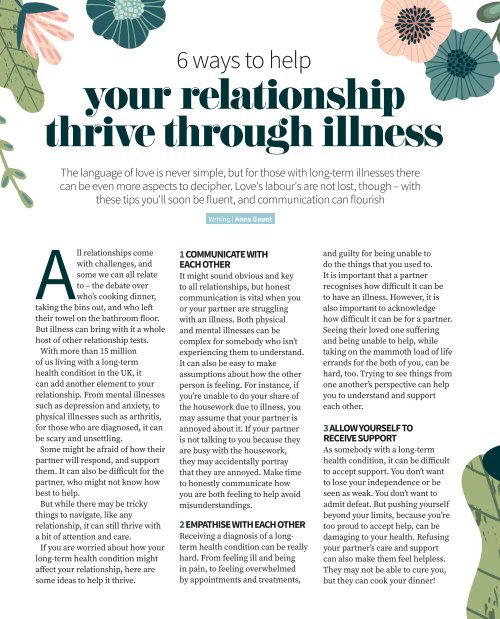Happiful August 2019
Create successful ePaper yourself
Turn your PDF publications into a flip-book with our unique Google optimized e-Paper software.
6 ways to help<br />
your relationship<br />
thrive through illness<br />
The language of love is never simple, but for those with long-term illnesses there<br />
can be even more aspects to decipher. Love's labour's are not lost, though – with<br />
these tips you'll soon be fluent, and communication can flourish<br />
Writing | Anna Gaunt<br />
All relationships come<br />
with challenges, and<br />
some we can all relate<br />
to – the debate over<br />
who’s cooking dinner,<br />
taking the bins out, and who left<br />
their towel on the bathroom floor.<br />
But illness can bring with it a whole<br />
host of other relationship tests.<br />
With more than 15 million<br />
of us living with a long-term<br />
health condition in the UK, it<br />
can add another element to your<br />
relationship. From mental illnesses<br />
such as depression and anxiety, to<br />
physical illnesses such as arthritis,<br />
for those who are diagnosed, it can<br />
be scary and unsettling.<br />
Some might be afraid of how their<br />
partner will respond, and support<br />
them. It can also be difficult for the<br />
partner, who might not know how<br />
best to help.<br />
But while there may be tricky<br />
things to navigate, like any<br />
relationship, it can still thrive with<br />
a bit of attention and care.<br />
If you are worried about how your<br />
long-term health condition might<br />
affect your relationship, here are<br />
some ideas to help it thrive.<br />
1 COMMUNICATE WITH<br />
EACH OTHER<br />
It might sound obvious and key<br />
to all relationships, but honest<br />
communication is vital when you<br />
or your partner are struggling<br />
with an illness. Both physical<br />
and mental illnesses can be<br />
complex for somebody who isn’t<br />
experiencing them to understand.<br />
It can also be easy to make<br />
assumptions about how the other<br />
person is feeling. For instance, if<br />
you’re unable to do your share of<br />
the housework due to illness, you<br />
may assume that your partner is<br />
annoyed about it. If your partner<br />
is not talking to you because they<br />
are busy with the housework,<br />
they may accidentally portray<br />
that they are annoyed. Make time<br />
to honestly communicate how<br />
you are both feeling to help avoid<br />
misunderstandings.<br />
2 EMPATHISE WITH EACH OTHER<br />
Receiving a diagnosis of a longterm<br />
health condition can be really<br />
hard. From feeling ill and being<br />
in pain, to feeling overwhelmed<br />
by appointments and treatments,<br />
and guilty for being unable to<br />
do the things that you used to.<br />
It is important that a partner<br />
recognises how difficult it can be<br />
to have an illness. However, it is<br />
also important to acknowledge<br />
how difficult it can be for a partner.<br />
Seeing their loved one suffering<br />
and being unable to help, while<br />
taking on the mammoth load of life<br />
errands for the both of you, can be<br />
hard, too. Trying to see things from<br />
one another’s perspective can help<br />
you to understand and support<br />
each other.<br />
3 ALLOW YOURSELF TO<br />
RECEIVE SUPPORT<br />
As somebody with a long-term<br />
health condition, it can be difficult<br />
to accept support. You don’t want<br />
to lose your independence or be<br />
seen as weak. You don’t want to<br />
admit defeat. But pushing yourself<br />
beyond your limits, because you’re<br />
too proud to accept help, can be<br />
damaging to your health. Refusing<br />
your partner’s care and support<br />
can also make them feel helpless.<br />
They may not be able to cure you,<br />
but they can cook your dinner!

















